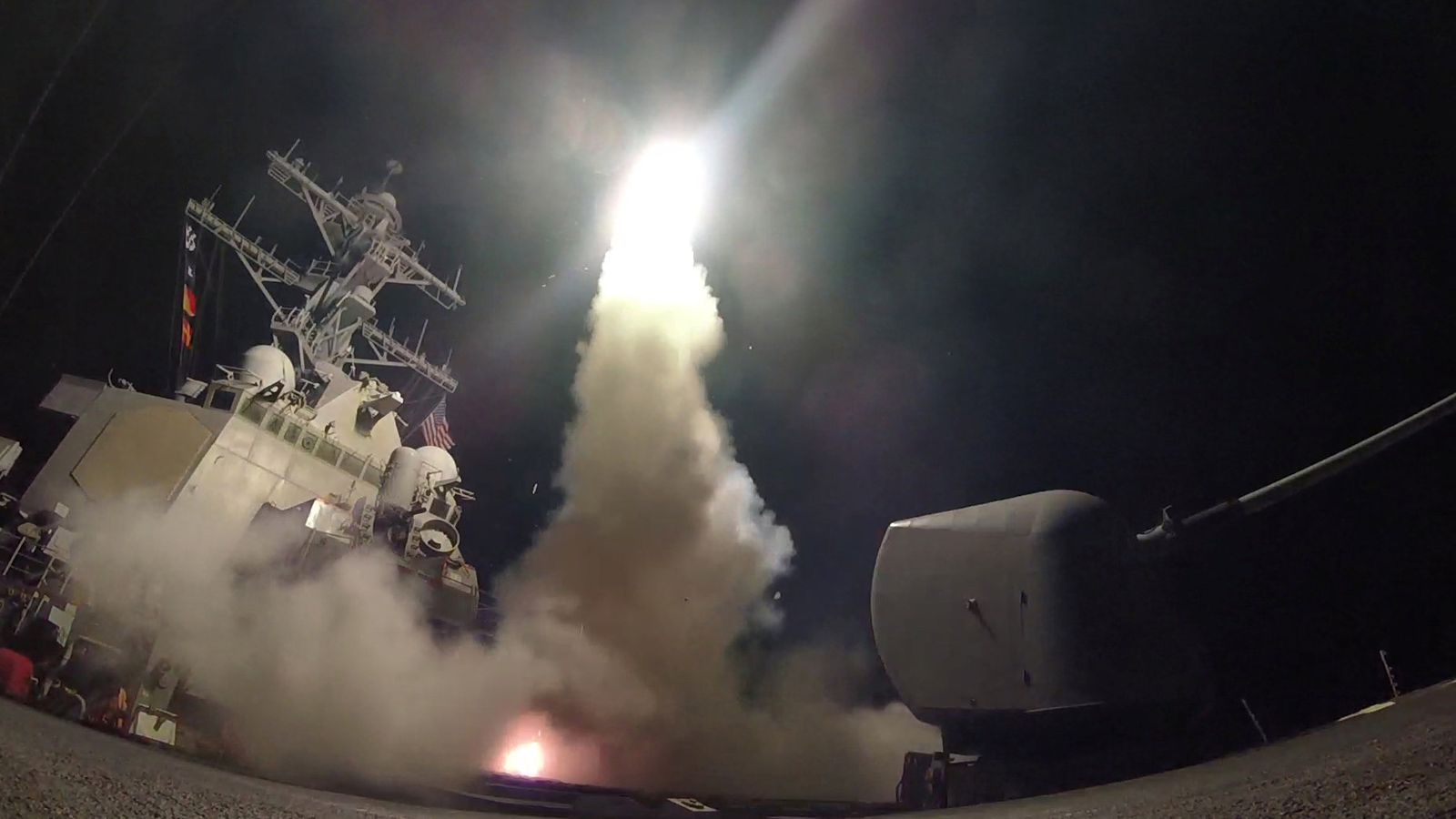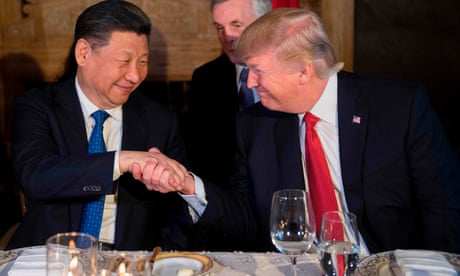By Tom Phillips in Beijing

For Xi Jinping, it was supposed to be a chance to show himself as the political titan whom Communist party propagandists fete as the “leader of China’s great revival”.
During a two-day visit to Donald Trump’s glamorous Mar-a-Lago estate, Xi would grab headlines as a globe-trotting statesman whose nation could now stand side by side with the world’s leading superpower.
But Trump’s decision to unleash a barrage of cruise missiles against Syria, a decision made just before he sat down to dinner with Xi, has upended those plans and risks derailing an embryonic rapprochement that followed months of tensions between the leaders of the world’s two largest economies.
“China will be upset that strikes occurred in the middle of Xi’s first meeting with Trump – indeed probably while having dinner – where Xi [was supposed to] reinforce his image as a strong Chinese leader on the world stage,” said M Taylor Fravel, an associate professor of political science at the Massachusetts Institute of Technology.

A dinner of steak and carrots, then Trump's cruise missiles struck Syria
Paul Haenle, a veteran US diplomat who advised both George W Bush and Barack Obama on China, agreed that Trump’s move would go down badly with Beijing.
During a two-day visit to Donald Trump’s glamorous Mar-a-Lago estate, Xi would grab headlines as a globe-trotting statesman whose nation could now stand side by side with the world’s leading superpower.
But Trump’s decision to unleash a barrage of cruise missiles against Syria, a decision made just before he sat down to dinner with Xi, has upended those plans and risks derailing an embryonic rapprochement that followed months of tensions between the leaders of the world’s two largest economies.
“China will be upset that strikes occurred in the middle of Xi’s first meeting with Trump – indeed probably while having dinner – where Xi [was supposed to] reinforce his image as a strong Chinese leader on the world stage,” said M Taylor Fravel, an associate professor of political science at the Massachusetts Institute of Technology.

A dinner of steak and carrots, then Trump's cruise missiles struck Syria
Paul Haenle, a veteran US diplomat who advised both George W Bush and Barack Obama on China, agreed that Trump’s move would go down badly with Beijing.
“But more importantly, I think it says a lot about the US power and preeminent leadership role. It’s hard to imagine any other country in the world making that kind of unilateral strike – certainly not China,” he said.
“I think it underlines the fact that despite Xi’s interest in using this summit to position himself and China as a peer of the US and of Trump’s, China still has a very long way to go in terms of global power and influence. The US is still the world’s preeminent power and it remains the country that shoulders global responsibility, despite Trump’s desire to back away from that kind of international role.”
It was not immediately clear when Trump told Xi, whose government has repeatedly vetoed UN security council resolutions against Bashar al-Assad, about the attack, although a White House official told AFP he had been personally informed about US plans.
In a sign that Beijing was attempting to limit the damage to Xi’s US trip, China’s official news agency announced that Trump had accepted an invitation to visit China.
“I think it underlines the fact that despite Xi’s interest in using this summit to position himself and China as a peer of the US and of Trump’s, China still has a very long way to go in terms of global power and influence. The US is still the world’s preeminent power and it remains the country that shoulders global responsibility, despite Trump’s desire to back away from that kind of international role.”
It was not immediately clear when Trump told Xi, whose government has repeatedly vetoed UN security council resolutions against Bashar al-Assad, about the attack, although a White House official told AFP he had been personally informed about US plans.
In a sign that Beijing was attempting to limit the damage to Xi’s US trip, China’s official news agency announced that Trump had accepted an invitation to visit China.
“A thousand reasons to make the China-US relationship work; no reason to break it,” Xi reportedly told Trump.
On Friday, Hua Chunying, a spokeswoman for China’s foreign ministry, said Beijing opposed the use of force but stopped short of explicitly condemning the US strikes.
On Friday, Hua Chunying, a spokeswoman for China’s foreign ministry, said Beijing opposed the use of force but stopped short of explicitly condemning the US strikes.
Asked if the US attack on Syria would overshadow Xi’s meetings with Trump, Hua said China believed people were “paying close attention” to the Mar-a-Lago summit.
But Bonnie Glaser, the director of the China Power Project at the Center for Strategic and International Studies thinktank in Washington, said it was telling that the strikes had coincided with Xi’s arrival in Florida.
But Bonnie Glaser, the director of the China Power Project at the Center for Strategic and International Studies thinktank in Washington, said it was telling that the strikes had coincided with Xi’s arrival in Florida.
“None of this is planned, in my view,” she said.
“But I do think it necessarily sends a signal to Xi Jinping that this is a president that means business; that he is not going to sit around and spend an enormous amount of time weighing through things. He is just going to act very decisively.”
Fravel said the decision to attack Syria was unlikely to convince China to turn against Assad.
Fravel said the decision to attack Syria was unlikely to convince China to turn against Assad.
“If anything, the strikes will likely bring China and Russia even closer together over Syria, preventing the United States from effectively working through the United Nations,” he said.
However, experts believe it could strengthen Trump’s hand in his dealings with China in two ways.
First, the strikes have given greater credibility to recent US threats to take action to halt North Korea’s nuclear and missile programmes, with or without Chinese support.
After Trump’s failure to follow through on vows to label China a currency manipulator and his decision not to challenge Beijing over Taiwan, “the Chinese narrative has increasingly been that Trump is a paper tiger”, said Haenle.
That assumption would now have to change.
However, experts believe it could strengthen Trump’s hand in his dealings with China in two ways.
First, the strikes have given greater credibility to recent US threats to take action to halt North Korea’s nuclear and missile programmes, with or without Chinese support.
After Trump’s failure to follow through on vows to label China a currency manipulator and his decision not to challenge Beijing over Taiwan, “the Chinese narrative has increasingly been that Trump is a paper tiger”, said Haenle.
That assumption would now have to change.
“He just conducted the first ever US attack against Assad. I think he goes into [Friday’s] discussion with much greater credibility and leverage … The strike has obvious implications for discussions on North Korea,” he said.
Second, Trump’s dramatic move might also make Beijing rethink its alleged militarisation of the South China Sea.
Glaser said many held Barack Obama, reluctant to engage in military action, responsible for allowing China to step up its island-building campaign in the disputed territory.
Second, Trump’s dramatic move might also make Beijing rethink its alleged militarisation of the South China Sea.
Glaser said many held Barack Obama, reluctant to engage in military action, responsible for allowing China to step up its island-building campaign in the disputed territory.
There was “a sense that the Obama administration wasn’t willing to follow through on threats and was unwilling to use military force”, she said.
That calculation might also change.
That calculation might also change.
“It will play into how China will view Trump. I think they will view him with respect,” she said.
But the US president’s decision to undermine Xi’s authority so publicly also carries risks, not least alienating a powerful authoritarian who desperately needs to appear strong before a key political transition in China later this year.
Zhu Feng, an international relations specialist from Nanjing University, attempted to play down the significance of the US attacks.
But the US president’s decision to undermine Xi’s authority so publicly also carries risks, not least alienating a powerful authoritarian who desperately needs to appear strong before a key political transition in China later this year.
Zhu Feng, an international relations specialist from Nanjing University, attempted to play down the significance of the US attacks.
He said there was no connection between the strikes and Xi’s stay in Mar-a-Lago and described them as “a matter for the US”.
China’s president is unlikely to agree.
China’s president is unlikely to agree.
Aucun commentaire:
Enregistrer un commentaire